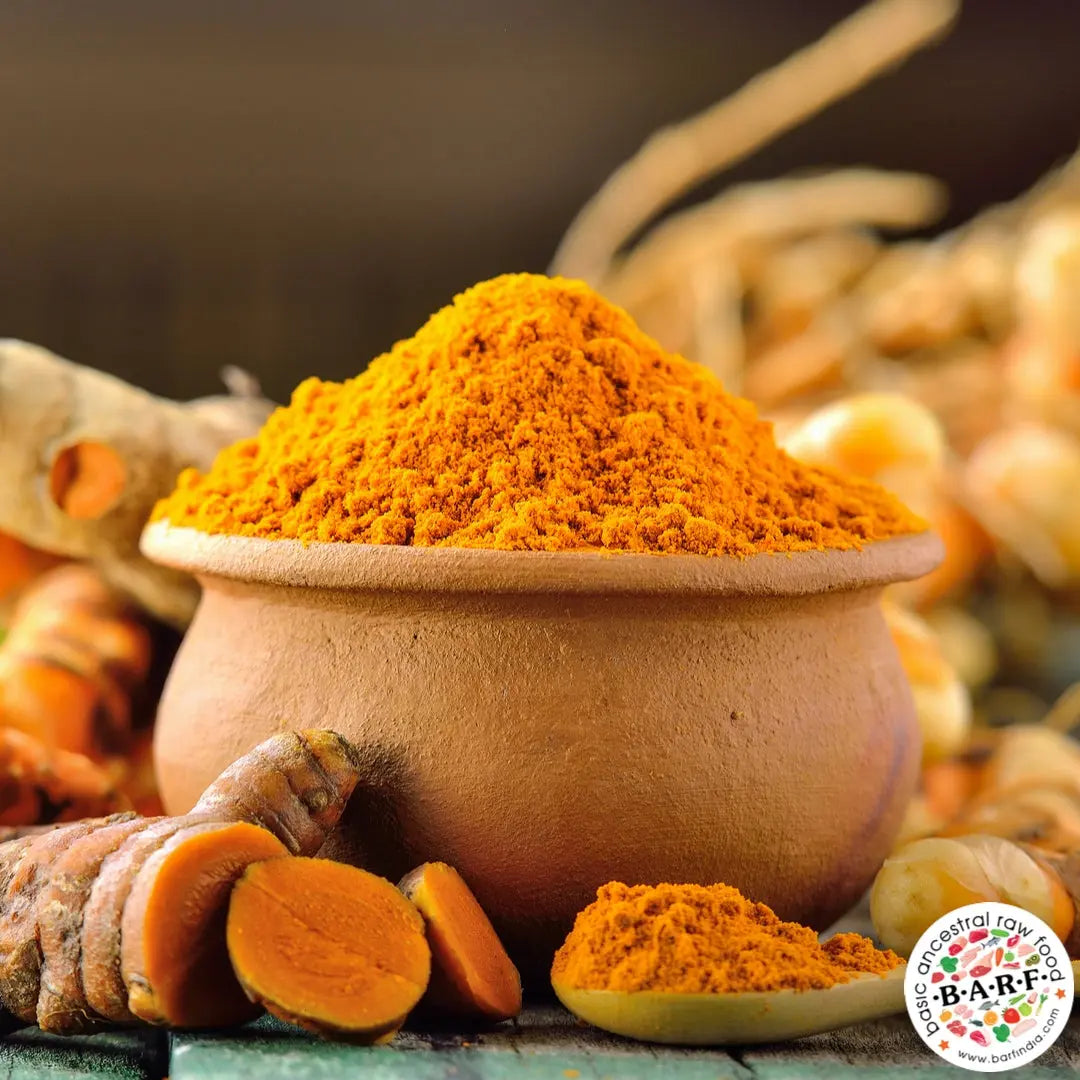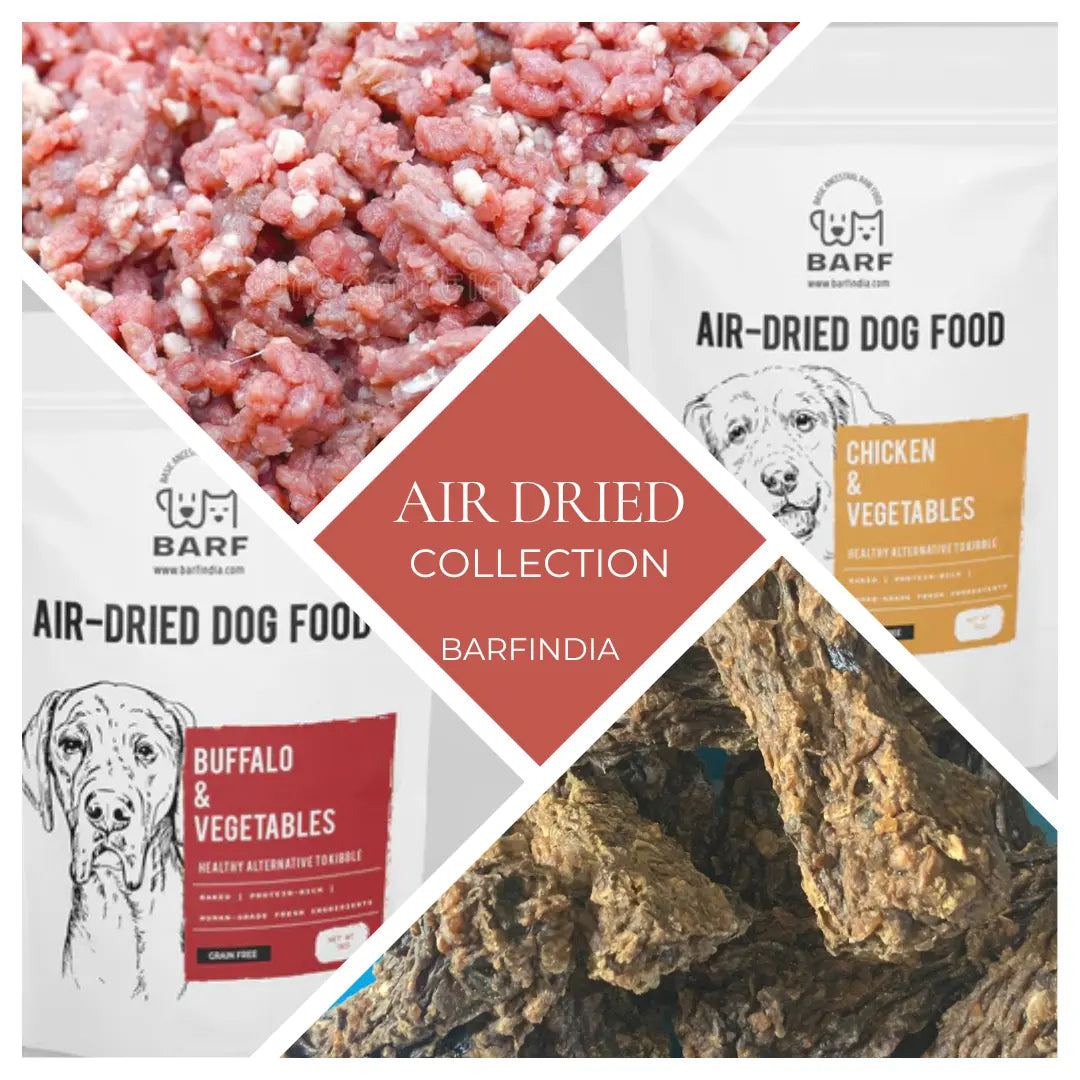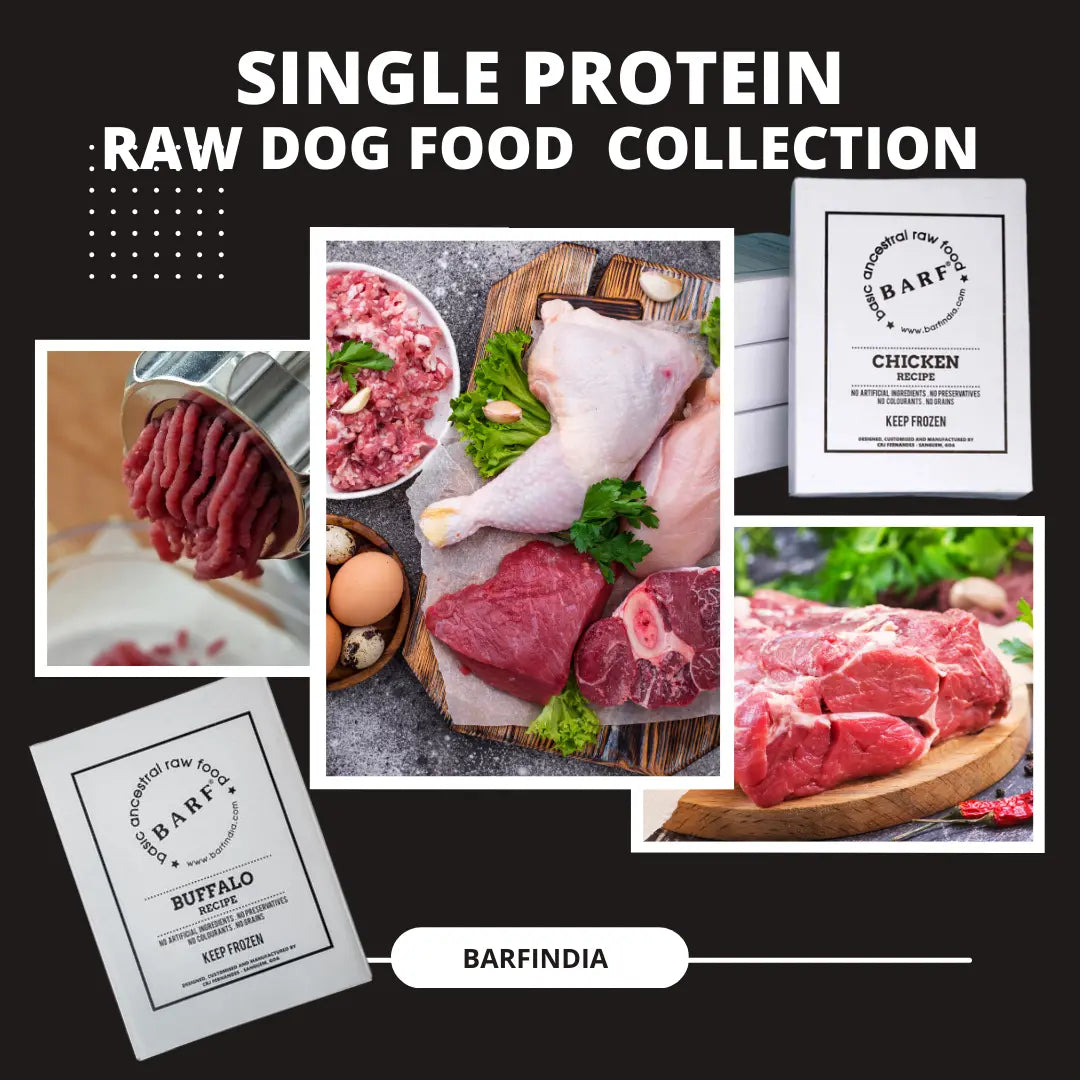
Benefits of Turmeric for your dog
B.A.R.F. India AdministratorTurmeric – A miracle herb!
Ancient Indian practices, dating to more than 4000 years ago, involved the use of turmeric for a plethora of applications. Turmeric is a rhizome (very similar to ginger), and was used in cosmetics, cooking, fabric dyeing, and medicine. India has been using turmeric for its medicinal properties for ages, and still to this day, turmeric remains the most natural remedy for ailments and hence it is often called as Turmeric - A miracle herb.
WHAT DOES SCIENCE SAY ABOUT TURMERIC?
Although age-old practices have prescribed turmeric for its various health benefits, scientific research was done more recently. The exact origin of the turmeric plant is unknown, but it is believed that the plant originated somewhere in South Asia or South East Asia. Turmeric, also known as Curcuma longa, is generally available in powdered form commercially. The powder has a pungent and slightly bitter taste.
What is Curcumin?
Curcumin is the substance found in turmeric that has proven to have anti-inflammatory, anti-microbial, anti-oxidant properties. Many turmeric supplements isolate the curcumin or ‘curcuminoids’ to potentially increase the effectiveness. More recent research has been focusing on the benefits of the complete herb as compared to isolated curcumin for health benefits. As research progresses, turmeric has been growing to become one of the most popular dietary supplements.
Anti-oxidant properties:
Due to its anti-oxidant properties, curcumin has shown to be very effective in destroying mutated cancer cells thereby inhibiting tumour formation and protecting cells from free radicals. If you have a dog that has been diagnosed with cancer and is undergoing treatment, addition of turmeric will reduce the chance of the cancer cells spreading to other organs. Curcumin also enhances liver function, allowing more efficient toxin elimination.
Bio-availability:
Bio-availability is the measure of absorption of a substance into the body so it can have an active effect. Not all substances that are consumed are entirely bio-available. This means that a part of your diet may be ingested, but only a part of it is absorbed into circulation and the rest is eliminated. Bio-availability of turmeric has been a hot topic of discussion in scientific research. Evidence from various literature studies revealed that curcumin has poor bio-distribution, metabolism, bio-availability, and absorption. Why are we discussing turmeric on a blog for dogs? Studies have shown that turmeric can reduce the risk of cancer, allergies and alleviate many more conditions in dogs. 
SHOULD YOU FEED YOUR DOG TURMERIC?
As far as dogs are concerned, the pungent, bitter taste should not bother them. We all know that dogs have 100 times more olfactory sensors than humans do, however, a dog averages about 1800 taste buds whereas a human has about 9000 of them. So, the taste of turmeric is not off-putting for most dogs. Dosage of turmeric you provide to your dog is important. Here’s a guideline for how much turmeric your dog can consume per day (reference by
)
| TURMERIC DOSAGE FOR DOGS (Daily intake based on your dog’s weight) | ||
| Weight | Dry Powder | Capsules / Pill supplements* |
| < 4.5 kg | 1/16-1/8 tsp | ½ |
| 4.5-9 kg | 1/8-1/4 tsp | ½-1 |
| 9-22.5 kg | ¼-1 tsp | 1-2 |
| 22.5-45 kg | 1-2 tsp | 1-2 |
| >45 kg | 2 tsp | Adult human dose |
| *based on the dosage on the label (generally 1-3 capsules per day) | ||
Other formulations using turmeric:
As scientific studies have shown, turmeric has become increasingly popular in current dog food formulations and supplements – almost in line with words like “omegas” and “
”. As with omegas and probiotics, the mention of turmeric on your dog food label does not mean that curcumin’s health benefits are bioavailable. How exactly is turmeric turning your dog’s health around? While there are multiple reasons your dog needs this in his/her diet today, let’s look at some of the most important ones:

ARE THERE ANY DOWNSIDES?
Just like with everything else, moderation is key when you are giving turmeric to your dog. There are some cases when you would need to eliminate turmeric altogether from your dog’s diet.
-
Nausea – Introducing too much turmeric too quickly to your dog, can cause nausea and/or diarrhoea in some dogs initially. Start slowly and work your way up to larger quantities.
- Constipation – Turmeric is known to be a binding agent, which may result in constipation in some dogs. Make sure you provide plenty of clean, fresh water and add yogurt to balance the gut microflora.
- Blood thinning – Due to turmeric being a blood thinner / anti-coagulant (which is beneficial in some cases), do not feed your dog turmeric if he/she has recently had surgery. If you are administering other blood thinning drugs temporarily, it is better to eliminate turmeric as it may increase the risk of bleeding.
- Increase hypoglycaemia – Dogs that are on diabetes medication or drugs that lower blood pressure, turmeric may enhance hypoglycaemia.
- Body odour – Some dogs have shown an increase in body odour (resembling cat urine) when consuming turmeric. Since this odour is unpleasant, many owners stop curcumin administration altogether.
- Kidney stones – Dogs diagnosed with kidney stones or prone to crystal formation, should be monitored if turmeric is being given. Turmeric may increase urinary oxalate levels, increasing the risk of kidney stone formation.
- Pregnant dogs – Turmeric may stimulate the uterus during pregnancy, so it is better to exercise caution at such a time.
- Warming herb – Turmeric naturally tends to have drying and warming effects on the body. If you have a dog that shows signs of excessive thirst, panting in cool places (unusual heating of the body), or generally a dog that tends to have a higher body temperature than normal, then discontinue the use of turmeric.

RECIPIES WITH TURMERIC – FOR YOUR DOG
Sprinkling some turmeric powder on your dog’s food will not do the complete job. As mentioned previously, increasing bioavailability with the use of pepper provides a better effect. Here are some homemade recipes you can use if you prefer not to use store bought turmeric supplements.
-
Golden Paste
- Ingredients
- Turmeric powder (1/2 cup)
- Coconut oil (1/3 cup)
- Fresh black pepper (ground) (2-3 tsp)
- Water (1-2 cups)
- Steps
- Boil the water in a pan and add the turmeric powder
- Keep stirring gently until it forms a thick paste
- Turn off the heat and add the coconut oil. Mix until the oil dissolves.
- Add some ground black pepper. Mix well and store in an air tight jar and refrigerate.
- Dosage for dogs (and humans too!)
- Start with ¼ tsp 2-3 times a day.
- Giant dogs can be given upto 1 tbsp a day.
- Ingredients
-
Turmeric gravy
- Ingredients
- Water (1/4 – 1/3 cup)
- Turmeric (1 tsp)
- Fresh black pepper (ground) (3 tsp)
- Olive oil (1 tsp)
- Steps
- Take turmeric in a cup and add boiling water to the cup
- Mix and let it cool for a few minutes
- Add the pepper and olive oil. Stir and store in the refrigerator for upto a week.
- You can pour this liquid on to your dog’s regular food.
- Dosage
- 2-3 tbsp per day and work your way up with large dogs
- Smaller dog breeds can be fed about 1 tbsp a day
- Ingredients
Watch out for some turmeric stains around your dog’s mouth – but your dog will know he/she enjoyed the meal and you know you have given all the health benefits you now know of!




